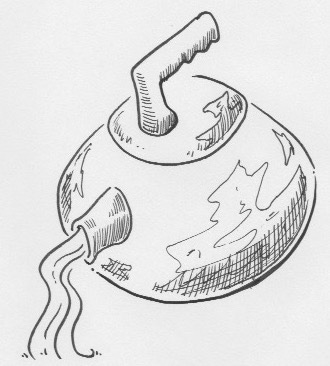I once heard a story—probably apocryphal—about a doctor and a writer going to their child’s kindergarten open house. All the kids have to introduce their parents and say what they do for a living. Their daughter says: “This is my mom, she’s a doctor. And this is my dad, he makes tea.”
For some reason, the caffeine in coffee doesn’t do much for me. It’s black tea that can keep me awake and focused. Lately, that involves making a thermos full of iced tea after breakfast. With raw sugar and lemon. I drink it all morning. Which drives my fiendish dental hygienist crazy. She says it’s like soaking my teeth in sugar. So I keep a water bottle nearby and take a sip and half-hearted swish once in a while.
My tea-making will never get me into a Zen monastery, but I do have fairly rigorous standards. I buy loose tea with the discrimination of a connoisseur and blend with a heathen’s reckless abandon. Those tea sacks or sachets are easier to use, but some kind of mesh insert is better.
These days I use a pitcher with a long mesh cylinder that’s designed for cold coffee (a concept I never understood anyway). I put in a few teaspoons of tea leaves—usually a combination of Ceylon and Assam. After the water boils furiously, I pour it in and let it steep for at least five minutes Or until I remember I left some tea brewing in the kitchen a half hour ago. They say steeping that long can make the tea bitter and/or extract a little more caffeine. Fortunately, my taste buds aren’t discriminating enough to be bothered by bitterness, and, as for caffeine, the more the merrier.
Many writers have written about tea. English authors like Jane Austen, Charles Dickens, and Henry James virtually tell time by it. Tea also figures prominently in the lives of Tolstoy, Dostoyevsky, Chekhov, and other Russian writers. (I’m half-Russian, well Lithuanian, so that might explain something. Or not.) I can picture Leo, Fyodor, and Anton, over-brewing their tea and then keeping it warm throughout the day in elaborate samovars that make my little teapots look short and stout.
More importantly, tea figures prominently in the lives of several of the world’s most important literary visionaries, including The Mad Hatter whose tea party borders on bacchanalia, Mary Poppins who is served tea by penguins, and Winnie the Pooh who drinks it because Piglet insists that it will make “pooh feel like pooh again.” A sentiment I fully appreciate.





i'm going to over steep my tea right now..
Little rituals that end with a buzz.
Perfect!!